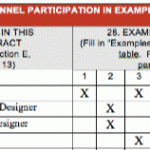 There were many people who joined the conversation about Whether Mistakes in Proposals Matter. Between this site and LinkedIn, there must have been 50 people who gave their two cents on the topic.
There were many people who joined the conversation about Whether Mistakes in Proposals Matter. Between this site and LinkedIn, there must have been 50 people who gave their two cents on the topic.
Many people agreed with me and completely understood my point. Some people said mistakes do matter (just not the kind of mistakes I was writing about). Other people disagreed saying mistakes are the kiss of death. And some consultants predictably weighed in to say mistakes are bad for your proposal and you should hire an outside person to edit (or write) them.
But one person had a comment that made my point so well, I just had to share it with the HEE readers…even though this person does think mistakes matter (but read what he says). This person is Tom Batty of BTAS, Inc..
“Happy Friday, everybody! If you take the time to carefully read all the comments in this thread you will find MANY mistakes. But we are communicating effectively; the “quality” level is appropriate for the circumstances/situation.
I agree with much of what Matt and some others have been saying. If we want to improve the quality of our proposals, we should focus first on the areas that give us the highest return for our effort. For most of us the biggest opportunities for improvement are (and forever will be) the fundamentals: compliance, a responsive and innovative technical/functional solution, a sound management approach, the right people assigned to doing the work, and proven corporate capabilities/qualifications based on past performance. Then of course none of it matters if we haven’t provided a compelling answer to the basic question, “Why should the customer award this contract to us?” and that usually includes having the right price.
But as I said earlier, the total quality of the proposal is important, so mistakes CAN matter a lot. It should not be an afterthought to use good grammar and to spell things correctly. Attention to these elements should be part of the daily discipline for everybody who does this kind of work. To underscore Matt’s point…any effort at improving proposals should focus first on more important things. However, it is my experience that when I find an abundance of poor grammar and numerous spelling mistakes, the rest of the proposal also is poorly done.”
Thank you for the comment, Tom.
If you liked this article, please subscribe below or on the right side of the homepage. If you want to give us your thoughts on this issue, please leave a comment below.
Don’t forget to leave a comment if you want a chance to win a FREE copy of Ford Harding’s Rainmaking.





I agree that if we can circumnavigate the RFP and tender process and engage so that we understand the clients need. In the last two major projects I have been involved in I have crafted a service delivery scope ( Not calling it a proposal) in draft form so that the prospect/client can make alterations. We must be seen to be consultative and collaborate not sell
Ken,
That happens a lot. I do agree people don’t like to be “sold.”
I’ve heard many stories of consultants writing an agency’s RFP. And it’s acceptable for an agency to “go out to the industry”for comments before an RFP hits the streets.
Obviously, for private clients anything goes. But on the public side, you just need to be careful that you aren’t breaking any procurement regulations.
Thank you for the comment.
A few years ago I learned that a County agency faced a technical challenge that was right up our experience-alley. I contacted the Department head, who I knew slightly. He welcomes my call and my generous offer to help him craft the scope of an RFP for free.
When the County procurement office learned of our dialogue, they ruled us disqualified to compete for the work. Even though we had not delivered any documentation and only had the conversation about the offering, in procurement’s mind that was enough to render us ineligible.
Fair warning…
If you are involved in writing an RFP, you shouldn’t be allowed to submit on it. That’s considered a conflict of interest.
Some agencies let it happen, but it really shouldn’t go on.
Matt, of course.
However, in the instant case we merely offered to assist. Our offer was not accepted and no assistance was provided of any kind, even verbal. Nevertheless, because we offered, we were deemed disqualified by Procurement. They bent over backward in their nervousness over the appearance of impropriety.
That would raise a red flag in my mind. It’s perfectly reasonable for an agency to “go out to the industry” for comments before the rfp hits the street. I would have put in a bid protest.
If you didn’t break a rule and they disqualified you, that’s a classic reason for a formal protest.
Very well said, Tom. I agree completely.
I find that many people these days don’t pay enough attention to grammar, spelling, etc. when that should be a fundamental skill – a “no brainer” if you will. Proper writing skills should be so developed that you don’t have to spend time thinking about them, and can focus your energy on being responsive to your client’s requests.
Karen,
Thank you for your comment. It is a fundamental skill that all who work on proposals should have. You have to take care in your work.
As lots of people pointed out, with spellcheck and other tools, spelling isn’t a huge problem these days. Usage and punctuation is often the issue. That’s the stuff spellcheck doesn’t do a great job with.
Agreed, Matt!
Karen,
Thank you for the comment.